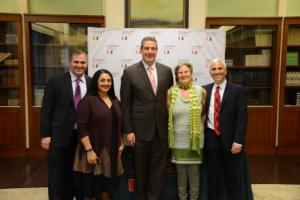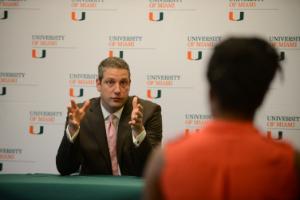Congressman Tim Ryan believes that mindfulness – which he defines as “paying attention to the present moment on purpose, without judging” – can change the future of America.
 |
| College of Arts & Sciences Dean Leonidas Bachas, Associate Professor of Psychology Amishi Jha, Congressman Tim Ryan, Maria T. Kluge, Lecturer in Law Scott Rogers |
“Mindfulness can position us to have more happiness and success, and to be in a better economic place,” Ryan said, in an address at UM last night.
A Democrat from northeastern Ohio and a former high school quarterback, Ryan came to mindfulness in 2008, when he was beginning his fourth term in Congress. “Things got hectic for me. I was 35, and felt like I would burn out by age 40.” He found that meditating for 10-15 minutes per day helped him channel his mental energy in a more positive direction.
After adopting the practice, Ryan became one of the nation’s most prominent advocates of mindfulness, particularly through his book, A Mindful Nation: How a Simple Practice Can Help Us Reduce Stress, Improve Performance, and Recapture the American Spirit.
“I got into politics to change things, to make a difference,” he said. “When you find something that can make a change, you want to push it out.”
Ryan discussed A Mindful Nation at UM last night, through the UMindfulness Lecture Series, an outreach activity of the UMindfulness Research & Practice Initiative. Led by Dr. Amishi Jha, director of contemplative neuroscience and associate professor of psychology in the UM College of Arts & Sciences, and Scott Rogers, director of the Mindfulness in Law Program at the School of Law, UMindfulness brings together cutting-edge brain research and mindfulness/contemplative practice training.
 |
| Congressman Tim Ryan (D-Ohio) |
UMindfulness is quickly expanding, and now includes faculty from the School of Music and School of Business, the Herbert Wellness Center, and other campus areas. Mrs. Maria T. Kluge, who attended last night’s event, has provided the funding to support the initiative.
Ryan’s book focuses on applications of mindfulness in education, athletics and the military. He also wanted to showcase “great scientists, like Amishi, who are pioneers in the field.”
Ryan said, “Not many people make good decision when they are under high levels of stress. Mindfulness does not get rid of stress, but helps you deal with it differently so it does not become consuming.”
In 2009, Ryan secured a $1-million grant to provide mindfulness education to students in the Youngstown and Warren schools, in his Ohio Congressional district.
He said the program is “giving kids the tools they need to really thrive – emotional and social skills, resilience, focus, and creativity.” The students are encouraged to meditate, and to visit “Peace Corners” to think, read, or write when they feel overwhelmed, anxious or angry. The results have been positive for both students and teachers.
Ryan said he hopes this model, which “gives ordinary people the tools to do extraordinary things,” can be adopted in more schools nationwide.
In Washington, Ryan leads the Quiet Time Caucus, a group of legislators and staff members who meet on Monday and Thursday mornings to meditate.
“It’s about community, and connecting at a deeper level,” Ryan said, adding, “Left, right, Democrat, Republican – we are looking for something new that could potentially be helpful in healing the political divide.”
November 11, 2014

